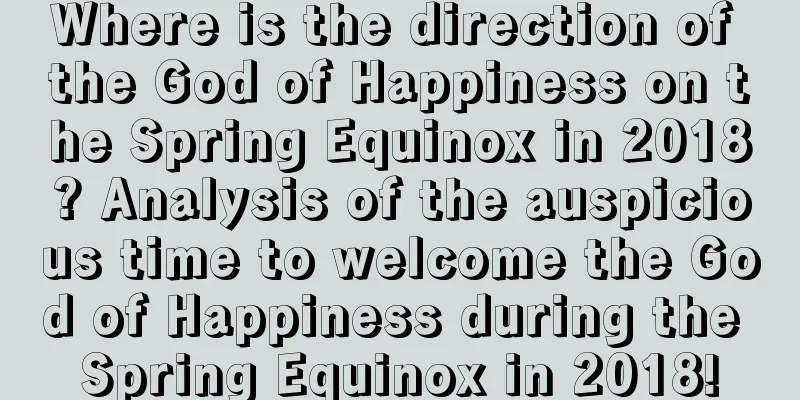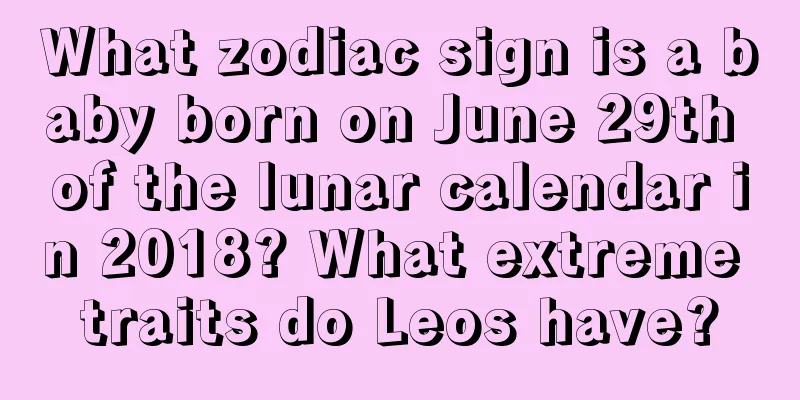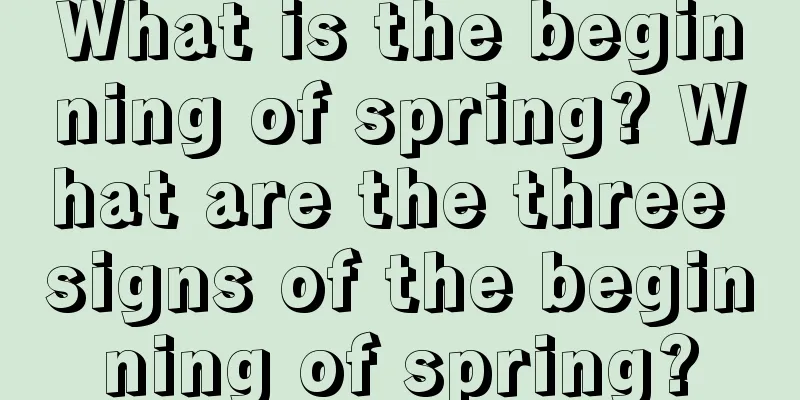Where is the direction of the God of Happiness on the Spring Equinox in 2018? Analysis of the auspicious time to welcome the God of Happiness during the Spring Equinox in 2018!

The Spring Equinox is an extremely important one among the 24 solar terms. In the ancient production and labor life, the arrival of the Spring Equinox means the arrival of the spring farming season. So in this important solar term, where is the direction of the God of Joy on the Spring Equinox in 2018? If you want to know more about the second month of the lunar calendar in 2018, please pay attention to our fortune teller website!Where is the direction of the God of Happiness on the Spring Equinox in 2018?According to the old Chinese almanac, on the day of the Spring Equinox: God of Wealth: God of Happiness: Due South God of Fortune: Northwest God of Wealth: Due South;The positions of the gods of happiness at different times on the day of the Spring Equinox:Zi Hour (23:00-00:59): God of Happiness Northwest Chou Hour (01:00-02:59): God of Happiness Southwest Yin Hour (03:00-04:59): God of Happiness Due South Mao Hour (05:00-06:59): God of Happiness Southeast Chen Hour (07:00-08:59): God of Happiness Northeast Si Hour (09:00-10:59): God of Happiness Northwest Wu Hour (11:00-12:59): God of Happiness Southwest Wei Hour (13:00-14:59): God of Happiness Due South Shen Hour (15:00-16:59): God of Happiness Southeast You Hour (17:00-18:59): God of Happiness Northeast Xu Hour (19:00-20:59): God of Happiness Northwest Hai Hour (21:00-22:59): God of Happiness SouthwestWhat kind of god is the God of Joy?The God of Joy is a deity widely believed in by the Chinese people. The God of Joy is the God of Good Luck, commonly known as the God of Happiness. Because people's wish is to seek good fortune and avoid misfortune, and pursue happiness and joy, they invented a god of joy. According to Chinese folk legend, the God of Joy was originally a pious woman who worshipped the God of the North Dipper. When she became an immortal through Taoism, the God of the North Dipper asked her what she wanted. The woman pursed her lips with her hand and smiled without answering. The God of the North Dipper mistakenly thought that she was praying for a beard, so he gave her a long beard. Because she looked happy when she smiled, she was named the God of Joy. Because of the long beard, she was no longer visible to mortals. From then on, the God of Joy was responsible for celebrations, but her divine form was not revealed. Therefore, the biggest feature of the God of Joy is that he has no specific image and no special temple. He is highly abstract. However, later generations also regarded portraits of ancestors or King Zhou of Shang as the God of Joy and worshipped them. The worship of the God of Joy is common in various ritual activities, especially in weddings.In my country, people usually welcome the God of Happiness on the fifth day of the first lunar month, which is a Chinese seasonal festival custom. It is popular in Shanxi, Henan, Shandong and the Yangtze River basin. It is carried out after worshipping gods and ancestors before dawn on the first day of the first lunar month. Chinese people believe that the God of Joy will descend at the beginning of the New Year, and after welcoming the God of Joy, everything will go well and joy will occur frequently throughout the year. |
<<: The meaning of the Dragon Raising its Head on February 2
>>: What activities are there during the Spring Equinox? When does the 2018 spring equinox begin?
Recommend
How should the bedroom be laid out in 2020 to attract wealth and improve financial luck?
The bedroom is where we rest. According to Feng Sh...
Is the fate of a girl born on October 20th of the lunar calendar in 2019 good or bad?
Is the fate of a girl born on October 20th of the ...
Can we move house during the Lantern Festival in 2020? Auspicious days for moving in the first month of the lunar year
Moving into a new house is a change in our living ...
Can I get married on October 11th of the lunar calendar in 2017? Is it okay to get a marriage certificate?
Good things always happen in winter, because peop...
Is the fifth day of the eighth lunar month in 2019 a good day to worship ancestors?
Sacrifice is an ancient folk activity that reflect...
Is it suitable to travel on the eighth day of the tenth lunar month in 2018?
The tenth month of the lunar calendar is the begin...
What day is the eighth day of the eighth lunar month in 2018? What month and date is it?
Want to know more about the dates in the eighth m...
What is the month, date and time of the summer solstice in 2022? Will it rain?
After the summer solstice, the temperature will co...
What is the fate of people born on Qingming Festival in 1998 under the sign of Tiger? Analysis of marriage compatibility for people born under the sign of Tiger!
Introduction: Many new lives are born during the Q...
Will it bring good luck to move into a new home during the Minor Cold in 2020? Are there any rituals for moving into a new home?
Moving into a new home is a matter of fortune and ...
Is July 20, 2020, an auspicious day for Bailu? What is the sentence before Bailu has not yet dried?
Introduction: The days of Bailu can also be auspic...
2021 Christmas Eve November 21st, lucky or unlucky time query
The eleventh month of the lunar calendar has arriv...
Is it okay to have a caesarean section on the ninth day of the sixth lunar month in 2021? What does the hexagram indicate?
The sixth month in the lunar calendar is a short m...
What is the zodiac sign of a child born on May 23rd of the lunar calendar in 2021? What's your personality like?
Speaking of constellations, I believe everyone is ...
Is it unlucky to get married on the Dragon Boat Festival in 2020? How many days of overtime pay will be calculated on the Dragon Boat Festival in 2020?
Introduction: Marriage is an important event in li...









